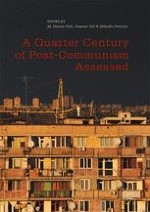2017 | OriginalPaper | Buchkapitel
Chapter 4: Curbing Post-Communist Corruption: External Pressure vs. Domestic Commitment
verfasst von : Leslie Holmes
Erschienen in: A Quarter Century of Post-Communism Assessed
Aktivieren Sie unsere intelligente Suche, um passende Fachinhalte oder Patente zu finden.
Wählen Sie Textabschnitte aus um mit Künstlicher Intelligenz passenden Patente zu finden. powered by
Markieren Sie Textabschnitte, um KI-gestützt weitere passende Inhalte zu finden. powered by
